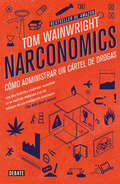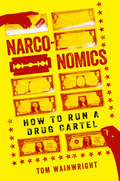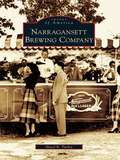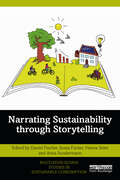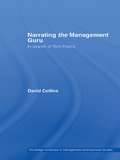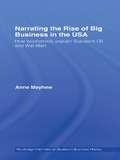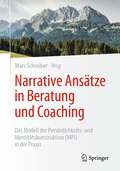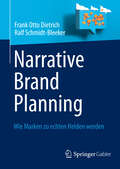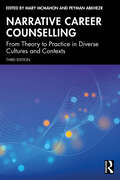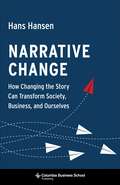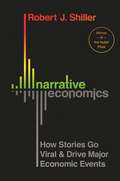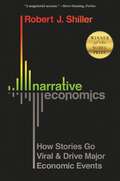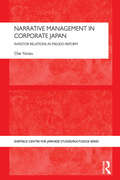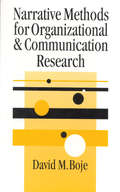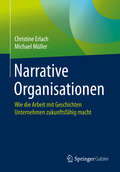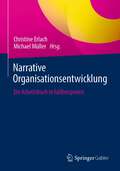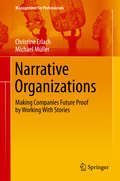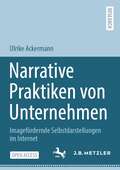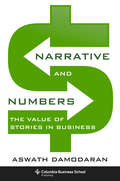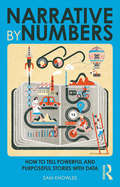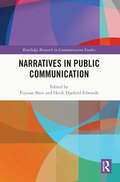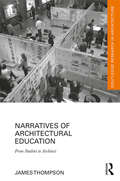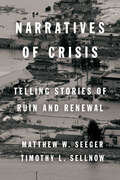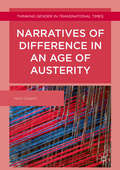- Table View
- List View
Narconomics: Cómo administrar un cartel de la droga
by Tom WainwrightTom Wainwright, reportero de The Economist, enseña las lecciones más importantes de economía y management detrás del funcionamiento de un cártel de drogas. Un libro que encantará a los lectores de Freakonomics o McMafia."Un libro de economía para la generación Breaking Bad" -The Times of London-¿Cómo puede ser exitoso (y sobrevivir) el jefe de una organización criminal que se está iniciando en el multimillonario negocio de los estupefacientes? Aprendiendo de los mejores, por supuesto. Desde la creación del valor de marca hasta poner a punto el servicio al cliente, las personas encargadas de administrar los cárteles de drogas han estudiado atentamente las tácticas y estrategias de corporaciones como Walmart, McDonald's y Coca-Cola.¿Y cómo pueden aprender los gobiernos a combatir este fenómeno? Si fueran conscientes de que los cárteles son compañías, los encargados de aplicar la ley podrían entender mejor su funcionamiento y dejarían de gastar millones de dólares en un esfuerzo inútil por ganar la "guerra" contra este negocio global y altamente especializado.El intrépido guía que conducirá al lector por los caminos de una de las industrias más salvajes en el planeta se llama Tom Wainwright. A través de los plantíos andinos de cocaína, las prisiones de Centroamérica, las tiendas de mota en Colorado o los sitios online de venta de drogas en la llamada Web Oscura (deep web), Wainwright brinda una mirada inédita y atrevida al comercio de drogas y sus 250 millones de consumidores.El elenco incluye a Bin Laden, el guía boliviano de la coca; al Viejo Lin, líder de una pandilla en El Salvador; a Starboy, el millonario roquero neozelandés productor de "pastillas para fiestas", así como a una amigable abuelita mexicana que cocina hot cakes de moras mientras planea un asesinato. Entre presidentes, policías y jóvenes matones, se explican asuntos importantes como el sofisticado simbolismo de los tatuajes, por qué los grupos delincuenciales deciden competir o coludirse, y las razones por las que los cárteles se preocupan de una manera sorprendente por la responsabilidad social corporativa.La crítica ha opinado:"Uno de los argumentos más concisos y convincentes que he leído a favor de una reforma legal sobre las drogas" -The New York Times-"Wainwright es uno de los periodistas con más suerte después de haber sobrevivido a su investigación" -The Washington Times-
Narconomics: How to Run a Drug Cartel
by Tom WainwrightThis is a unique look into the huge and fascinating multi-billion dollar international drug industry. Rather than reporting it as a "war,” Wainwight looked at the drug trade as a business, with a quarter billion customers and worldwide revenues of about $300 billion a year--with similar concerns as any Fortune 500 business, such as human resources, outsourcing and corporate social responsibility. Some of Wainwight’s insights to help turn the way we think about the war on drugs on its head include: *Supply and demand. Drug cartels, as monopoly-buyers, use tactics like forcing their suppliers, the farmers, to absorb price shocks when coca fields are eradicated, rather than absorb it themselves. *Research and development. The cartels have invested in innovative ways to increase yield from coca plants; so even though less coca is now grown, it yields more cocaine, thus keeping the supply chain in good shape. *Mergers and acquisitions. Why the violence and bloody battles of the Mexican cartels have been generated by opportunistic takeover attempts. *Competition and collusion. Why the mafias running El Salvador’s drug gangs realized that violent competition was hurting profits and opted for a strategy of collusion. *Social responsibility. How cartels "give back” to society by meeting social needs that governments have been unable to satisfy. *Media relations. How dedicated "press officers” communicate with (and threaten) local journalists to secure the kind of coverage the cartel wants and use the media to send intimidating messages to their rivals *Human resource models. How cartels, in a business with a high turnover of personnel because of all the killing use prisons as employment agencies and training academies to ensure a steady stream of new recruits for jobs that are risky and don’t pay particularly well. *Franchising. Lessons the cartels have learned from some of Fortune 500’s restaurant business'. Using classical economics and modern business theory to explain why drug cartels work in the way they do and based seven years of reporting in more than a dozen countries, Wainwright provides fascinating, humorous and novel insights into a multibillion-dollar worldwide industry and provides an innovative blueprint to address the drug problem, as well as a range of other criminal activities. If mobsters think like businessmen, law enforcers can thwart them by learning to think like economists.
Narragansett Brewing Company (Images of America)
by Hazel B. TurleyNarragansett Brewing Company was developed in 1890 by German American descendants in Cranston. Taking advantage of an underground aquifer, the company also made ice for thousands of customers. During Prohibition, the brewery continued to make and deliver ice, as well as a type of soda. After the repeal of Prohibition, the Haffenreffer familypurchased the brewery and began recalling previous workers to help restore the brewery and bring it to the highest production rate ever. After World War II,advertising manager Jack Haley shifted the company focus to hospitality with the now famous slogan, "Hi Neighbor, Have a 'Gansett!" Before long, Narragansett was the number one beer in New England. Through vintage photographs, Narragansett Brewing Company chronicles the fascinating history, tragic fall, and exciting rebirth of this local icon.
Narrating Sustainability through Storytelling (Routledge-SCORAI Studies in Sustainable Consumption)
by Daniel Fischer Sonja Fücker Hanna Selm Anna SundermannStories and narratives are powerful tools for explaining the world around us. This book explores storytelling as a way of engaging audiences with sustainable development issues and reflects on the opportunities and limitations of storytelling for sustainability as an innovative approach to sustainability communication. Bringing together voices and perspectives from research and practice, this volume explores the ways in which storytelling can support change toward sustainability. Unlike other anthologies, the book first provides a sound scientific basis by unfolding the storytelling approach and presenting empirical studies on its impact on effects. It clarifies important terms and presents recent findings on the impact of storytelling on sustainability from an extensive 3-year research project on this question. The second part shows how storytelling can be used in different fields of practice to communicate sustainability in more engaging and effective ways. Here, the main focus is on not only case-based accounts of positive change, but also tensions, arising from the application of storytelling for sustainability in journalism, higher education, corporate communication, or science communication. Combining theory with practical examples, this innovative book will be a great resource for students and scholars of environmental communication and sustainable development, as well as professionals working in related fields.
Narrating the Global Financial Crisis: Urban Imaginaries And The Politics Of Myth (Palgrave Studies in Globalization, Culture and Society)
by Miriam MeissnerThis book analyzes how the Global Financial Crisis is portrayed in contemporary popular culture, using examples from film, literature and photography. In particular, the book explores why particular urban spaces, infrastructures and aesthetics - such as skyline shots in the opening credits of financial crisis films - recur in contemporary crisis narratives. Why are cities and finance connected in the cultural imaginary? Which ideologies do urban crisis imaginaries communicate? How do these imaginaries relate to the notion of crisis? To consider these questions, the book reads crisis narratives through the lens of myth. It combines perspectives from cultural, media and communication studies, anthropology, philosophy, geography and political economy to argue that the concept of myth can offer new and nuanced insights into the structure and politics of popular financial crisis imaginaries. In so doing, the book also asks if, how and under what conditions urban crisis imaginaries open up or foreclose systematic and political understandings of the Global Financial Crisis as a symptom of the broader process of financialization.
Narrating the Management Guru: In Search of Tom Peters (Routledge Advances In Management And Business Studies)
by David CollinsDavid Collins, a well respected scholar of management gurus proves a critical reappraisal of the very influential work of Tom Peters. This volume examines his key works and reviews his detractors, offering an analysis of his contributions to the field of management that goes beyond the simple chronological model that has previously been used. Colli
Narrating the Rise of Big Business in the USA: How economists explain standard oil and Wal-Mart (Routledge International Studies In Business History Ser.)
by Anne Mayhew"This is a story about stories and specifically about some of the stories that Americans have told themselves about corporate economic power." In this book, Anne Mayhew focuses on the stories surrounding the creation of Standard Oil and Wal-Mart and their founders , John D. Rockefeller and Sam Walton, combining the accounts of economists with the s
Narrative Ansätze in Beratung und Coaching: Das Modell der Persönlichkeits- und Identitätskonstruktion (MPI) in der Praxis
by Marc SchreiberIn Beratung und Coaching wird sehr häufig mit narrativen Ansätzen gearbeitet. Narrative Ansätze leiten Klient*innen dazu an, die eigene Biografie zu reflektieren und dadurch den Blick auf sich selbst sowie die eigene Identität in verschiedenen Lebensbereichen zu richten. Das vorliegende Buch beinhaltet verschiedene Methoden für die Anwendung der narrativen Psychologie in der Beratungspraxis.Dabei wird im ersten Teil des Buches das Modell der Persönlichkeits- und Identitätskonstruktion (MPI) als Grundlage für die narrativen Ansätze theoretisch hergeleitet. Auf der Basis des sozialen Konstruktionismus integriert das MPI Ansätze aus der Laufbahn- und Persönlichkeitspsychologie wie die Career Construction Theorie (CCT) von Savickas, oder die Theorie der Persönlichkeits-System-Interaktionen (PSI-Theorie) von Kuhl sowie die drei Ebenen des Selbst nach McAdams: Soziale*r Akteur*in, motivierte*r Agent*in und autobiografische*r Autor*in. Darüber hinaus nimmt das MPI Bezug zu den industriellen Revolutionen von Arbeiten 1.0 bis Arbeiten 4.0.Elf Kapitel mit narrativen Methoden für die Praxis vermitteln dazu im zweiten Teil des Buches anschauliche Beispiele für die Anwendung in Beratung und Coaching, jeweils strukturiert in einen spezifischen Theorieteil, der Erläuterung der Anwendung in der Praxis und einem Praxisbeispiel.
Narrative Brand Planning
by Ralf Schmidt-Bleeker Frank Otto DietrichNarrative Brand Planning - wie Marken zu echten Helden werden Das digitale Zeitalter hat die gute alte Werbewelt gehörig auf den Kopf gestellt. Mediennutzer haben sich vom passiven Konsumenten hin zu aktiven Produzenten von Medieninhalten entwickelt - und das jederzeit und überall! Leider hat das konventionelle Marketing die Menschen schon seit langem aus den Augen verloren. Als Reaktion verhängen wir Menschen immer häufiger die Höchststrafe: vollkommenes Desinteresse an Marken und ihren Versprechen. Was die digitale Welt aus Menschen, Medien und Marken jedoch nach wie vor braucht wie die Luft zum Atmen, sind echte Geschichten! Werbung muss weg von fiktiven Erzählungen innerhalb einzelner Werbemaßnahmen, hin zu realen Handlungen auf Markenebene! Das erzeugt spannende, transmediale und vor allem glaubwürdige Geschichten, die sich Menschen gut und gerne erzählen. Frank Otto Dietrich und Ralf Schmidt-Bleeker entwerfen mit Narrative Brand Planning einen Ansatz, wie man im digitalen Zeitalter Relevanz für Geschäftsmodelle, für Markenstrategien und Markenkommunikation erzeugen kann. Oder kurz: wie man Marken Schritt für Schritt zu echten Helden macht.
Narrative Career Counselling: From Theory to Practice in Diverse Cultures and Contexts
by Mary McMahon Peyman AbkhezrBoth accessible and comprehensive, Narrative Career Counselling bridges the gap between theory and practice to allow a full understanding of the topic and allow confident implementation within professional settings.This new edition offers updated chapters showcasing an increased focus on diverse contexts and cultures. It brings together 33 high-profile international experts from 10 countries to share perspectives on theory and provide practical ideas about how to implement narrative career counselling. Fully updated to reflect changes in the field, including the growth of narrative counselling, it: provides a foundation for narrative career counselling by considering its philosophical and theoretical background; presents a range of approaches that demonstrate the integration of theory and practice; studies the application of narrative career counselling in a range of cultures and contexts; and provides examples of practical application. This resource is essential reading for anyone who wants to learn more about narrative career counselling including beginners to the field, experienced researchers, career counsellor educators, career counsellors, and practitioners and students studying in this field.
Narrative Change: How Changing the Story Can Transform Society, Business, and Ourselves
by Hans HansenTexas prosecutors are powerful: in cases where they seek capital punishment, the defendant is sentenced to death over ninety percent of the time. When management professor Hans Hansen joined Texas’s newly formed death penalty defense team to rethink their approach, they faced almost insurmountable odds. Yet while Hansen was working with the office, they won seventy of seventy-one cases by changing the narrative for death penalty defense. To date, they have succeeded in preventing well over one hundred executions—demonstrating the importance of changing the narrative to change our world.In this book, Hansen offers readers a powerful model for creating significant organizational, social, and institutional change. He unpacks the lessons of the fight to change capital punishment in Texas—juxtaposing life-and-death decisions with the efforts to achieve a cultural shift at Uber. Hansen reveals how narratives shape our everyday lives and how we can construct new narratives to enact positive change. This narrative change model can be used to transform corporate cultures, improve public services, encourage innovation, craft a brand, or even develop your own leadership.Narrative Change provides an unparalleled window into an innovative model of change while telling powerful stories of a fight against injustice. It reminds us that what matters most for any organization, community, or person is the story we tell about ourselves—and the most effective way to shake things up is by changing the story.
Narrative Economics: How Stories Go Viral and Drive Major Economic Events
by Robert J. ShillerFrom Nobel Prize–winning economist and New York Times bestselling author Robert Shiller, a new way to think about how popular stories help drive economic eventsIn a world in which internet troll farms attempt to influence foreign elections, can we afford to ignore the power of viral stories to affect economies? In this groundbreaking book, Nobel Prize–winning economist and New York Times bestselling author Robert Shiller offers a new way to think about the economy and economic change. Using a rich array of historical examples and data, Shiller argues that studying popular stories that affect individual and collective economic behavior—what he calls "narrative economics"—has the potential to vastly improve our ability to predict, prepare for, and lessen the damage of financial crises, recessions, depressions, and other major economic events.Spread through the public in the form of popular stories, ideas can go viral and move markets—whether it's the belief that tech stocks can only go up, that housing prices never fall, or that some firms are too big to fail. Whether true or false, stories like these—transmitted by word of mouth, by the news media, and increasingly by social media—drive the economy by driving our decisions about how and where to invest, how much to spend and save, and more. But despite the obvious importance of such stories, most economists have paid little attention to them. Narrative Economics sets out to change that by laying the foundation for a way of understanding how stories help propel economic events that have had led to war, mass unemployment, and increased inequality.The stories people tell—about economic confidence or panic, housing booms, the American dream, or Bitcoin—affect economic outcomes. Narrative Economics explains how we can begin to take these stories seriously. It may be Robert Shiller's most important book to date.
Narrative Economics: How Stories Go Viral and Drive Major Economic Events
by Robert J. ShillerFrom Nobel Prize–winning economist and New York Times bestselling author Robert Shiller, a groundbreaking account of how stories help drive economic events—and why financial panics can spread like epidemic virusesStories people tell—about financial confidence or panic, housing booms, or Bitcoin—can go viral and powerfully affect economies, but such narratives have traditionally been ignored in economics and finance because they seem anecdotal and unscientific. In this groundbreaking book, Robert Shiller explains why we ignore these stories at our peril—and how we can begin to take them seriously. Using a rich array of examples and data, Shiller argues that studying popular stories that influence individual and collective economic behavior—what he calls "narrative economics"—may vastly improve our ability to predict, prepare for, and lessen the damage of financial crises and other major economic events. The result is nothing less than a new way to think about the economy, economic change, and economics. In a new preface, Shiller reflects on some of the challenges facing narrative economics, discusses the connection between disease epidemics and economic epidemics, and suggests why epidemiology may hold lessons for fighting economic contagions.
Narrative Management in Corporate Japan: Investor Relations as Pseudo-Reform (The University of Sheffield/Routledge Japanese Studies Series)
by Chie YorozuScandals and failures in some of the best known international Japanese-owned companies have shown that there is sometimes a considerable difference between the public and internal narratives of Japanese firms. This book explores the extent to which Japanese firms' public claims reflect wider reality. Exploring how and why corporate narrative-management is 'accepted' or 'rejected' by external and internal audiences in Japan, the book clarifies what narrative-management means for Japanese organizations. It argues that the role of narrative-management has become much more prevalent in Japan in recent years, but that it does not serve quite the same role as it does in the Western environments where the theory and practice first emerged. The author presents interview-based case studies within four very different large Japanese organisations, all of which have deployed and loudly announced new restructuring plans based largely on Western models of corporate 'best practice'. The book aims to describe and account for these Japanese corporate narratives, and asks what they are, why they are deployed and who believes in them. As the first narrative-related work in the Japanese context, this volume provides an insight into the development of Japanese narrative-management. It will appeal to students and scholars of Japanese Business, International Business and Organizational Studies.
Narrative Methods for Organizational & Communication Research (SAGE series in Management Research)
by David Boje`The book is a unique and excellent introduction to postmodern narrative analyses′ - Organization Studies `[This book] should succeed in putting the metaphorical cat amongst just about every metaphorical pigeon that might imaginably take flight within the organization and communication research arenas. Story time will never be the same again, nor will interpretative research′ - Stewart Clegg, University of Technology, Sydney `Timely and first rate. It nicely stretches a reader′s thinking about the topic′ - Thomas Lee, University of Washington, School of Business `David Boje is a pioneering theorist in organization studies and management... [His book] is yet another example of Boje′s pioneering spirit and concern for exactitude. [His] scholarly account of narrative and antenarrative methods is both corrective and exploratory of how stories must be understood in terms of their own internal dynamics, and not viewed as static entities. Boje′s book is a magnificent start... A book that breaks new ground in organizational analysis, this is a must-read for researchers and practitioners in the fields of organization and management studies′ - Adrian Carr, University of Western Sydney `Boje masterfully shows how to analyze texts and ideas before they are reduced and fitted into the dominant ideological frameworks of the day. [He] provides a powerful tool for achieving greater democracy in how we approach doing social science... [and] liberates our capacity to make meanings for ourselves′ - Paul Hirsch, Northwestern University, Kellogg Graduate School of Management `This is an important book. It is a major methodological contribution to critical, postmodern studies of organizations and management. It is essential reading for critical management scholars′ - Robert P. Gephart, Jr., University of Alberta School of Business `David Boje has emerged as the leading postmodern thinker in management theory and organization science. His prolific output lights the path for others to follow in a field awakening to the challenge of postmodern critical theory. Updating and revising narrative theory for the prevailing "postmodern condition," Boje masterfully reconstructs the concepts and methods of storytelling, as he subverts the dominant principles of modernist organization theory. He offers a subtle and complex notion of narrative... This impressive book should leave an indelible mark on management and organization studies′ - Steven Best, University of Texas, El Paso An essential guide for academics and researchers needing to look at alternative discourse analysis strategies. As a research tool, narrative methods have become increasingly useful in organization studies, where much research involves the interpretation of ′stories′ in some form. This methodology can be applied where qualitative story analyses can help to assess interview, newspaper or web document stories for research projects. In this book, Boje sets out eight analysis options that can deal with storytelling, recognizing that stories in organizations can be self-destructing, flowing, networking and not at all static. In so doing, he shows ways in which narrative methods can be supplemented by ′antenarrative′ methods, where fragmented and collective storytelling can be interpreted. A valuable resource that will be widely used in organizational or communications research, for graduate level qualitative methods seminars and by researchers wanting to do story analysis. David Boje is Professor at the New Mexico State University. He is also on the editorial board of the journal Organization.
Narrative Organisationen: Wie die Arbeit mit Geschichten Unternehmen zukunftsfähig macht (Management For Professionals Ser.)
by Michael Müller Christine ErlachWarum narrativ selbstbewussten Organisationen die Zukunft gehörtDieses Fachbuch zeigt auf, wie in nahezu allen Handlungsfeldern eines Unternehmens mit Geschichten bzw. narrativen Ansätzen gearbeitet werden kann und welcher Mehrwert sich aus einer ganzheitlich-narrativen Perspektive auf das Unternehmen ergibt. Die Autoren nehmen dabei – trotz wissenschaftlicher Fundierung – keine theoretische Perspektive ein, sondern die des Praktikers: Geschäftsführende, Führungskräfte, Organisationsentwicklerinnen, Unternehmenskommunikatoren und Beraterinnen finden in dem Buch einen ganzheitlichen narrativen Ansatz und die detailreiche Beschreibung der Methoden. Durch den Einsatz dieser narrativen Methoden können Führungsstile, Kommunikations-, Wissens- und Changemanagement so gestaltet werden, dass einerseits der Identitätskern des Unternehmens immer ersichtlich bleibt, die Organisation sich dabei aber agil und transformativ in die Zukunft entwickeln kann. So wird sie narrativ intelligent und geht in Resonanz mit Gesellschaft und Märkten. Die theoretische Basis für diese Methoden bildet die Perspektive, das Unternehmen als eine erzählende und erzählte Organisation zu betrachten: Geschichten aus Vergangenheit und Gegenwart sowie narrative Erzählentwürfe für die Zukunft sind entscheidende Stellschrauben für Wissensaustausch, Lernen, Veränderung, Leadership und Kommunikation.Aus dem InhaltNarrative Organisationen: Organisationen sind das, worüber erzählt wird Die narrative Konstruktion der OrganisationWas in Organisationen wichtig ist: Der Sinn der OrganisationDie Werte der OrganisationErfahrungen erzählen: Das Wissen der OrganisationKommunikation in Unternehmen findet in Geschichten stattStorytelling und StorylisteningNarrative Methoden und VorgehensweisenNarrative InterviewsErzählworkshopLearning HistoriesCore StoryNarrative SystemlandkarteTransfer StoriesNarrative Change-ArchitekturenNarrative StrategieentwicklungFallbeispiele zum Einsatz narrativer Methoden im Wissenstransfer, bei Veränderungsprozessen und Storytelling in der Öffentlichkeitsarbeit
Narrative Organisationsentwicklung: Ein Arbeitsbuch in Fallbeispielen
by Michael Müller Christine ErlachDie Narrative Organisationsentwicklung ist ein relativ neues Paradigma, das jedoch zunehmend Eingang in Change-, Strategie-, Kommunikations-, Wissensmanagement- und Entwicklungsprozesse in Unternehmen findet. Die Prämisse dahinter ist, dass Sinn (Purpose), Werte, Identität, Wissen und Kommunikation von Unternehmen wesentlich durch narrative Strukturen (Geschichten und Erzählungen) definiert, entwickelt und weitergegeben werden.Dieser Band versammelt Fallbeispiele, in denen narrative Ansätze und Methoden in der Organisationsentwicklung von Praktiker*innen angewendet wurden. Sie dienen als Anregung, in der eigenen Organisation mit narrativen Herangehensweisen zu arbeiten. Jedes Fallbeispiel ist so anschaulich und transparent erzählt, dass der/die Leser*in Methoden, Strategien und Abläufe an den Bedarf der eigenen Organisation oder des eigenen Projektes anpassen kann. Der Band ist ein Arbeitsbuch, das Ideen gibt und Methoden in ihrer Anwendbarkeit transparent macht – und so den Leser*innen den Einstieg in die Narrative Organisationsentwicklung und -beratung erleichtert.Die Idee des Buches entstand im Rahmen der ersten europäischen Fortbildung in der "Narrativen Organisationsberatung"; die Fallarbeiten der Teilnehmenden zur Zertifizierung in der Fortbildung, die sie in ihren Herkunftsorganisationen durchgeführt haben, bilden den Grundstock dieses Buches. Ergänzt wurde es durch Fälle weiterer Alumni der Fortbildungen der Herausgeber*innen sowie erfahrener Praktiker*innen in der narrativen Organisationsentwicklung.
Narrative Organizations: Making Companies Future Proof by Working With Stories (Management for Professionals)
by Michael Müller Christine ErlachThis book shows how to work with stories and narrative approaches in almost all fields of action of a company, and demonstrates the added value resulting from a holistic narrative perspective. The authors take thereby a practice-based perspective from the viewpoint of managing directors, the C-suite, organizational developers, corporate communicators and advisers with a rich description of the methods and implementation.By the employment of these narrative methods, leadership styles, communication, knowledge and change management can be planned in such a way that on the one hand the identity-core of the enterprise remains always apparent and on the other, the organization can develop in an agile fashion into the future.
Narrative Praktiken von Unternehmen: Imagefördernde Selbstdarstellungen im Internet
by Ulrike AckermannDiese Open-Access-Publikation befasst sich mit dem Erzählen im Unternehmenskontext, was spätestens seit der Einführung des Storytelling in den 1999er-Jahren allgegenwärtig ist. Der Band zeigt in diesem Zusammenhang, wie Unternehmen das Erzählen explizit im Internet nutzen, um sich nach außen positiv darzustellen (= Imageförderung). In der Veröffentlichung wird deutlich, dass für die (Selbst)Darstellung bestimme Spezifika von Erzählungen von besonderer Bedeutung sind. Mit ihrer Hilfe können Unternehmen bspw. Konzepte – wie Corporate Responsibility – als gelebte Werte den Zielgruppen diskret veranschaulichen oder den Arbeitsalltag zu einem besonderen Erlebnis stilisieren. Insgesamt identifiziert die Autorin vier Grundtypen der (Selbst)Darstellung mit jeweils spezifisch narrativer Rhetorik sowie bezeichnende narrative Realisierungsformen, um diese Typen im WWW an die gewünschten Zielgruppen zu kommunizieren. Hierbei zeichnen sich die sprachwissenschaftlich analysierten Erkenntnisse durch ihre interdisziplinäre Einbettung aus. Dadurch eröffnen sich Anschlussmöglichkeiten zu anderen Fachdisziplinen.
Narrative and Numbers: The Value of Stories in Business (Columbia Business School Publishing)
by Aswath DamodaranHow can a company that has never turned a profit have a multibillion dollar valuation? Why do some start-ups attract large investments while others do not? Aswath Damodaran, finance professor and experienced investor, argues that the power of story drives corporate value, adding substance to numbers and persuading even cautious investors to take risks. In business, there are the storytellers who spin compelling narratives and the number-crunchers who construct meaningful models and accounts. Both are essential to success, but only by combining the two, Damodaran argues, can a business deliver and sustain value.Through a range of case studies, Narrative and Numbers describes how storytellers can better incorporate and narrate numbers and how number-crunchers can calculate more imaginative models that withstand scrutiny. Damodaran considers Uber's debut and how narrative is key to understanding different valuations. He investigates why Twitter and Facebook were valued in the billions of dollars at their public offerings, and why one (Twitter) has stagnated while the other (Facebook) has grown. Damodaran also looks at more established business models such as Apple and Amazon to demonstrate how a company's history can both enrich and constrain its narrative. And through Vale, a global Brazil-based mining company, he shows the influence of external narrative, and how country, commodity, and currency can shape a company's story. Narrative and Numbers reveals the benefits, challenges, and pitfalls of weaving narratives around numbers and how one can best test a story's plausibility.
Narrative by Numbers: How to Tell Powerful and Purposeful Stories with Data (Using Data Better)
by Sam KnowlesShortlisted for the Business Book of the Year Awards in the Sales and Marketing category. As jobs become increasingly similar, there are two skills that everyone needs if they’re going to thrive. These are the ability to interrogate and make sense of data, and the ability to use insights extracted from data to persuade others to act. Analytics + storytelling = influence. Humans are hardwired to respond to stories and story structure. Stories are how we make sense of and navigate the world. We respond best to stories that are based on evidence. But storytellers need to use data as the foundation of stories, not as the actual stories themselves. To be truly impactful, rational facts need to be presented with a veneer of emotion. The Big Data revolution means more data is available than ever. The trouble is, most people aren’t very numerate or good at statistics. Many find it hard to look at data and extract insights. Meanwhile, those for whom numbers hold no fear don’t always make the best storytellers. They mistakenly believe they need to prove their point by showing their workings. There are some simple and effective rules of data-driven storytelling that help everyone tell more compelling, evidence-based stories, whoever they need to convince. Narrative by Numbers shows you how.
Narratives in Public Communication (Routledge Research in Communication Studies)
by Fuyuan Shen Heidi Hatfield EdwardsThis volume explores the applications of narrative and storytelling in corporate, public health, and political communications, and its implications for those fields. Using diverse research methods including surveys, experiments, case studies, and content analyses, an international team of authors first explore conceptual and theoretical issues of narrative persuasion, then examine the impact and application of narratives in science communication, political advertising, corporate communication, and social movement before discussing the use of stories in community building, identity construction, and civic engagement. This timely volume will be of interest to academics, researchers, and graduate students who are interested in narratives and communications, within the areas of public relations, public communication, organizational communication, strategic communication, risk and crisis communication, and political communication.
Narratives of Architectural Education: From Student to Architect (Routledge Research in Architecture)
by James ThompsonNarratives of Architectural Education provides an overview of life as an architecture student, detailing how a layperson may develop an architectural identity. This book proposes becoming an architect as a personal narrative of professional development structured around various stages and challenges associated with identity transformation. Using a case study of aspiring architects along multiple time points of their professional education, Thompson investigates the occupational identity of architects; how individuals construct a sense of themselves as future architects and position themselves within the architectural community. This book provides previously unexamined insights into not just the academic development of an architect, but also the holistic and experiential aspects of architectural education. It would be ideal for those in the educational field of architecture, to include students, educators, interns, and mentors.
Narratives of Crisis: Telling Stories of Ruin and Renewal
by Timothy Sellnow Matthew SeegerHow did you first hear about 9/11? What images come to mind when you think of Hurricane Katrina? How did your community react to the Sandy Hook Elementary School shooting? You likely have your own stories about these tragic events. Yet, as a society, we rarely stop to appreciate the narratives that follow a crisis and their tremendous impact. This book examines the fundamental role that narratives play in catastrophic events. A crisis creates a communication vacuum, which is then populated by the stories of those who were directly affected, as well as crisis managers, journalists, and onlookers. These stories become fundamental to how we understand a disaster, determine what should be done about it, and carry forward our lessons learned. Matthew W. Seeger and Timothy L. Sellnow outline a typology of crisis narratives: accounts of blame, stories of renewal, victim narratives, heroic tales, and memorials. Using cases to illustrate each type, they show how competing accounts battle for dominance in the public sphere, advancing specific organizational, social, and political changes. Narratives of Crisis improves our understanding of how consensus forms in the aftermath of a disaster, providing a new lens for comprehending events in our past and shaping what comes from those in our future.
Narratives of Difference in an Age of Austerity
by Irene GedalofThis book traces the narrative strategies framing austerity policies through an illuminating analysis of policy documents and political discourses, exposing the political consequences for women, racialized minorities and disabled people. While many have critiqued the ways in which austerity has captured the contemporary political narrative, this is the first book to systematically examine how these narratives work to shift the terms within which policy debates about inequality and difference play out. Gedalof's exceptional readings of these texts pay close attention to the formal qualities of these narratives: the chronologies they impose, their articulation of crisis and resolution, the points of view they construct and the affective registers they deploy. In this manner she argues persuasively that the differences of gender, race, ethnicity and disability have been stitched into the fabric of austerity as excesses that must be disavowed, as reproductive burdens that are too great for the austere state to bear. This innovative, intersectional analysis will appeal to students and scholars of social policy, gender studies, politics and public policy.
